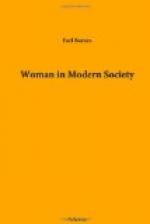The love of ease among women is in a measure independent of the emancipation movement, but the entry of great numbers of young women into lines of independent livelihood has placed them in a condition where the ideals of a materialistic and commercial civilization appeal to them with great force. Many of them have been liberally educated and are living lives of independence. They lodge in flats or boarding houses where they have no responsibilities for the routine work connected with daily living. They carry their own latch-keys; and no one interferes with their friendships or their pleasures. They read the books they like, attend the theaters that appeal to them, and avoid people who bore them. One can easily understand why these young women hesitate before abandoning their easy conditions for the uncertain economic position of wife and mother, with a man whose career lies in the future. And yet here, as everywhere, one must lose one’s life to gain it.
What then does daily association of a man and woman who belong together do for them? It gives gladness and peace, and these are fundamental conditions for all good and healthful living. It gives incentive to effort, for a man or woman dares not fail before the one he or she loves; but, in case of failure, it gives comfort and support, for love understands and credits intent and effort as highly as achievement. It complements the powers, for it gives four eyes, four hands and two minds with but one aim. And in this it does not simply multiply by two, but the blended powers are far more than two times one. It calls into activity all the gracious, artistic and altruistic powers of the soul. Surely these are gifts for which we may well forego some material comforts, may well work, and even face anxieties unafraid.
Each part of the human unit must educate the other to a realization of the fulness of life. This education is not entirely dependent on physical intimacy. It is the development of soul and spirit. It polishes the manners, cultivates the voice, broadens the judgments, sharpens the wit. It makes conversation an art and discussion significant. A woman-hating man or a man-hating woman is an unpolished and half-alive creature, whether he be a mediaeval saint, or she a militant suffragette, or they both be simply commonplace egoists.
Because married life is so perfect when it finds its highest levels, it is capable of sinking to any form of vulgarity, base betrayal and cynicism when realization fails. The God to whom noblest souls aspire in hours of deepest exaltation, is the God invoked by the ribald drunkard when he curses his comrade. The family life we are discussing is the subject of most of the vulgar and indecent jokes of the disappointed and the unfit. The earth which nourishes the nations, merely soils the boots of the boor who unthinkingly lives on her bounty.




